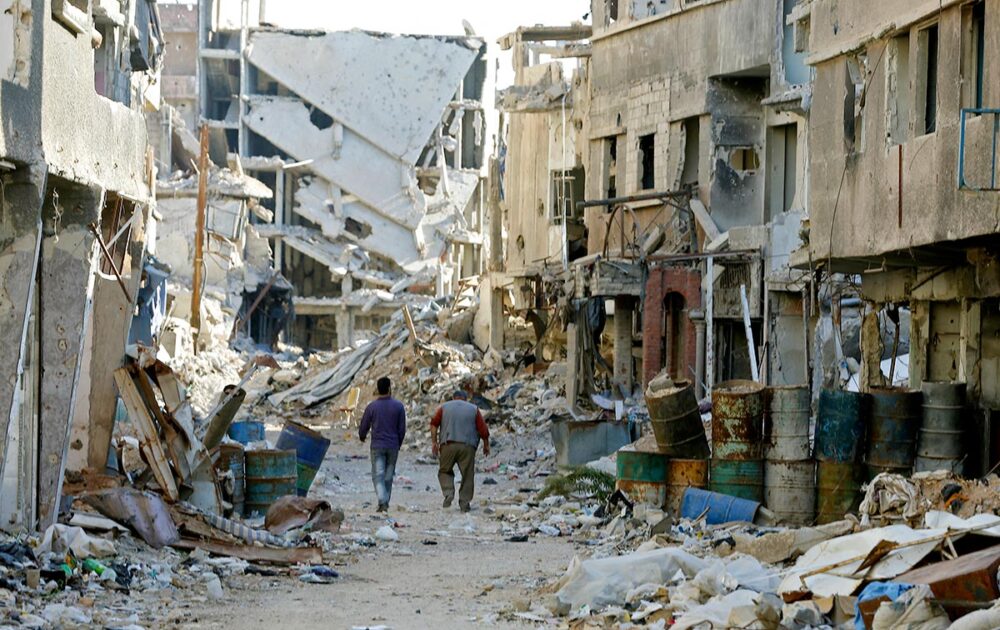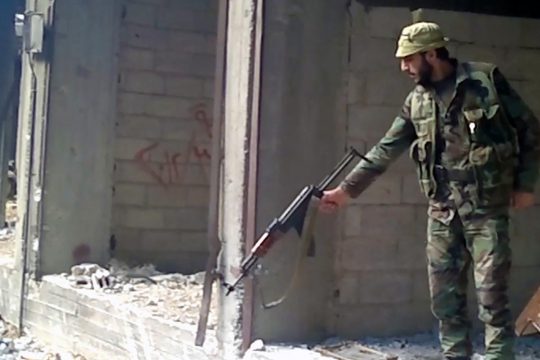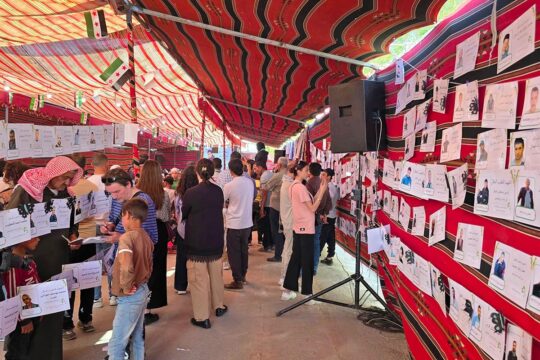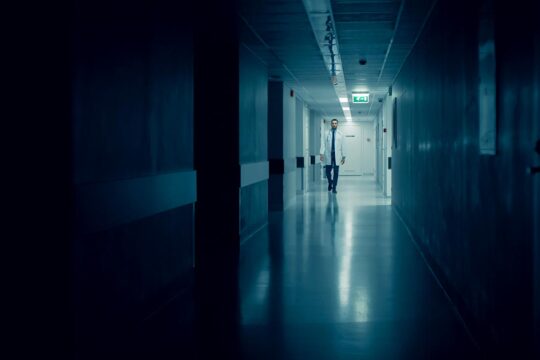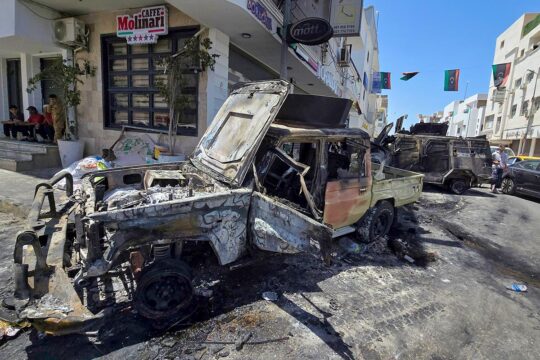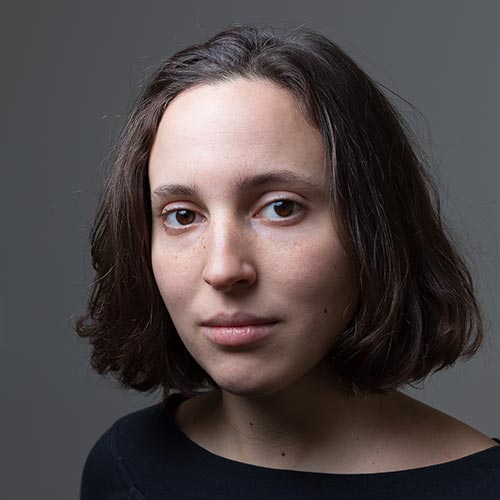Two years ago, one of the most shocking pieces of visual evidence of the Syrian regime’s atrocities was widely circulated: a collection of videos that show a massacre of civilians in Damascus in April 2013. The name of the neighborhood, Tadamon, has since become a synonym for the arbitrary terror inflicted by the Assad regime against its population.
So when, in late May 2024, a trial started in the German city of Hamburg, dealing with atrocity crimes in Tadamon, it seemed obvious that the massacre would play a role. And indeed, it has not only been mentioned prominently in the indictment, but was also the subject of the first witness' testimony. And yet, the mass killing of civilians in Tadamon is not among the indicted crimes. Defendant Ahmed H. is charged with crimes against humanity and war crimes for arbitrarily detaining individuals, abusing them and coercing them into forced labor, as well as stealing from local shops as part of a pro-regime militia in Tadamon between 2012 and 2015. While he seems like a more marginal figure, the first few weeks of the trial have made clear that the Tadamon massacre will loom over the proceedings and serve as a backdrop for the crimes he is accused of.
The indictment, read by the prosecution on the first day of the trial, claims that Ahmed H. was a member of a Shabiha militia that cooperated with the National Defense Forces, in Tadamon. “By order of the Syrian regime, this militia was tasked with violently oppressing any oppositional efforts in At-Tadamon together with military secret services branch 227.” The prosecution added that “members of branch 227 killed at least 47 civilians during mass executions on April 16th and October 16th 2013” in Tadamon.
The defendant, who worked as a truck driver in Syria, has been living in Germany since 2016. Arrested in August 2023, he has been held in pre-trial detention, and since January this year, in solitary confinement due to “danger of collusions”, according to the court. His trial began on May 17th of this year.
Fear of checkpoints in Tadamon
Ahmed H. is said to have operated checkpoints in Tadamon, where he and his colleagues arrested passers-by arbitrarily. According to the indictment, they abused them, forced their relatives to pay money for their release or coerced them into forced labor. “The defendant personally participated in the abuse of civilians”, the indictment states, and describes a case in which Ahmed H. punched a man in the face and instructed other militiamen to abuse him over several hours. In another case, he allegedly beat up a civilian at one of the checkpoints. “The defendant grabbed the victim’s hair and smashed his head onto the pavement.” In addition, Ahmed H. is accused of arresting nine individuals between 2012 and 2014 and forcing them to transport sandbags to the frontline. He is also said to have stolen goods from local stores up until 2015.
On July 16, 2024, Ahmed H. sat with his head bowed in room number 288 of the criminal court of Hamburg. That Tuesday and the following day, four witnesses testified. All of them lived in Tadamon, and were subjected to abuse, forced labor and arbitrary detention by the Assad regime's militias between 2012 and 2015. While none of them recognized the 47-year-old defendant with greying hair, a meaty face and sharply curved eyebrows, their testimonies can help the prosecution establish the framework of the crimes committed and understand how the militias controlled the neighborhood. Going to work or school, the witnesses would have to pass one of the countless checkpoints set up by armed units, where they would risk being arbitrarily detained. Some were able to buy their way out, others were forced to hard labor, digging tunnels or carrying sandbags to the front line between Tadamon and Yarmouk, where they risked being shot by opposition forces.
“We tried to avoid the checkpoints by walking through small backstreets, so we wouldn’t be harassed,” recalled one witness, who was detained twice. Talking about these events was painful for him, he said, adding that he had not slept for two days before his testimony. Another witness, who was just a teenager at the time, recalled having to pass four checkpoints on his way to school. “Sometimes we had to wait for a long time. We were very scared,” he said, adding that one time, he was detained and forced to work for seven hours without food or water. After his testimony, he sat in the corridor crying, while a friend consoled him.
Seen with an alleged perpetrator of the massacre
During the first sessions in court in May and June, the Tadamon massacre played a key role. One of the first witnesses was Dutch scholar Annsar Shahhoud who has become known for her unusual research: after receiving video recordings of the Tadamon massacre from a source in Syria in 2019, she and her colleague, Uğur Ümit Üngör from the Institute for War, Holocaust and Genocide Studies in Amsterdam, created an alter-ego online to get in touch with the involved militiamen and, after gaining their trust, collected evidence regarding their part in the crimes.
In the recordings, that circulated online two years ago, dozens of individuals are led by armed men in military uniforms to a large hole in the ground. They are told to jump or run in and are shot as they do so. Later, the killers pour fuel over the bodies and burn them.
In Hamburg, Shahhoud was questioned about her research strategies and findings. Several videos of Tadamon's brutal killings were viewed. None of them showed Ahmed H. committing any crimes or being present during killings but, in one recording, he is seen riding a truck with the secret services' officer believed to be responsible for the Tadamon massacre and other crimes against civilians in the neighborhood. This video, sent to the German prosecutors by the Dutch researchers, is the proof that triggered the investigation against Ahmed H.
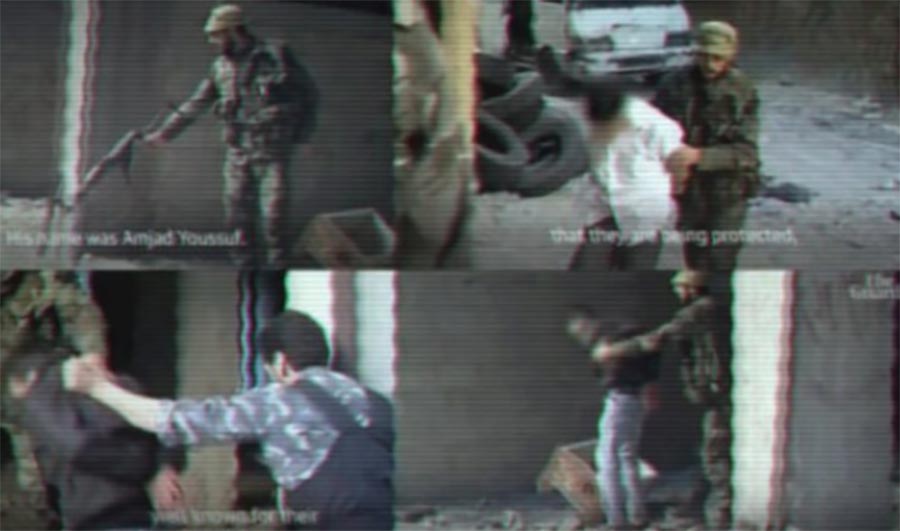
A defendant lost in Arabic translation?
Procedurally, the first weeks of trial in Hamburg have not exactly run smoothly. On the very first day, the proceedings had to be delayed by two hours, because the defendant appeared in court wearing prison attire and flipflops. He had to be provided with court-appropriate clothing, before the session could continue. The same happened on the second day.
There have also been issues with translation. One single translator has to interpret Arabic to German and German to Arabic for the witnesses and the defendant. The defense claims that the Moroccan translator and the Syrian defendant do not understand each other, given the different dialects and Ahmed H.’s low level of education that makes it hard for him to understand Modern Standard Arabic. Defense lawyer Reza Moschref accuses the court of pushing through with their schedule no matter what. The court, on the other hand, claims that there are no problems with the translation.
“We are not happy at all with how this trial has been going,” said Moschref. Apart from translation, he sees the anonymization of key witnesses as a problem for the defense. One of these witnesses, who testified on day four and five of the trial, is the one who found the videos of the Tadamon massacre on the computer of the alleged perpetrator and forwarded them to the researchers in Amsterdam. He has also claimed to have witnessed Ahmed H. abusing civilians on two occasions. For security reasons, this witness did not have to give any personal information or answer any questions that might reveal his identity. “If we had been able to question him properly, we might have found some clues in favor of our client,” says Moschref. Other witnesses, who have testified or will testify, have also been granted the right to stay anonymous.
The court’s press officer, Marayke Frantzen, argues that witness protection “applies when there is reason to worry that revealing the witness’ identity or place of residence might threaten the life, limb or freedom of the witness or another person, such as relatives or friends in Syria”. She added that one of the witnesses had already received death threats from the military secret service. The question of defendants’ rights vs. witness protection has come up during all German trials dealing with Syria. Over the years, numerous witnesses have claimed that they or their family members in Syria had been threatened or would be in danger, if they testified. Some had to testify without protection regardless, others were allowed to remain anonymous.
Ahmed H. fit to stand trial
A third point of criticism for Moschref is the defendant’s health. In prison, Ahmed H. has been diagnosed with cancer. When he complained about nausea, dizziness and headaches on the second day of the trial, he was given painkillers, while the proceedings continued. Moschref believes that his client might not be fit to stand trial. He and his colleague have complained in court that the doctors do not communicate with them at all: “We don’t even know what type of cancer he has.” So they have requested that another doctor be consulted on whether the trial should be suspended due to their client’s health condition. A spokesperson for the court, however, told Justice Info that “the defendant’s ability to stand trial has been attested by a doctor”, and that all the information available to the court concerning Ahmed H.’s health is also shared with the defense.
All these difficulties lead Moschref to ask: “Can this trial be fair, when our client has no ability to participate in it?” His answer, which is clearly no, might be one of the reasons why the atmosphere in the Hamburg courtroom has been extremely tense. There have been several hostile exchanges between the defense on one hand, and the prosecution and judges on the other.
Trial dates in Hamburg have been scheduled until December.


